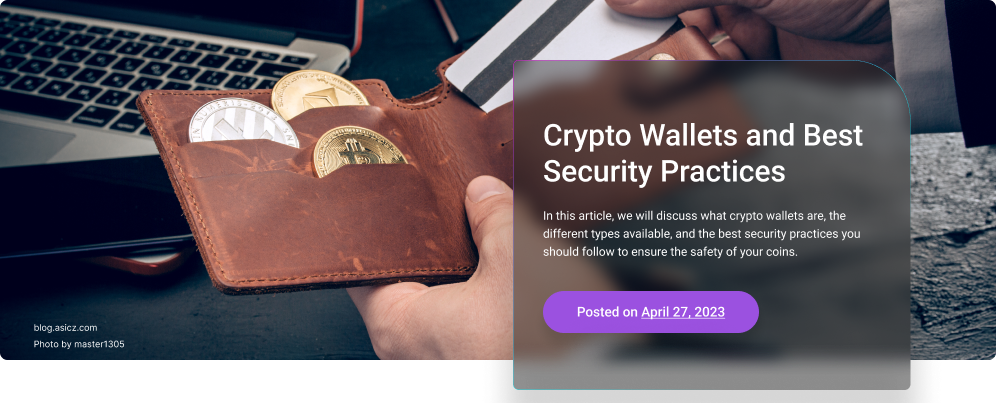Cryptocurrencies have become a popular investment option, with Bitcoin and other digital currencies gaining wider adoption. However, when dealing with these digital assets, security should be a top priority. One of the essential tools for keeping your cryptocurrencies safe and secure is a crypto wallet. In this article, we will discuss what crypto wallets are, the different types available, and the best security practices you should follow to ensure the safety of your coins.
A cryptocurrency wallet is a software program that stores public and private keys and interacts with blockchain networks to facilitate the sending and receiving of digital currencies and to monitor balances. These wallets come in different forms, such as mobile apps, desktop software, and hardware devices.
There are two main types of crypto wallets: hot wallets and cold wallets. A hot wallet is a wallet that is connected to the internet, which makes it more vulnerable to hacking attempts. When selecting a hot wallet, it’s important to choose a reputable provider. Look for a wallet that has a strong reputation in the cryptocurrency community and offers robust security features. For example, the Exodus wallet is a popular option that offers built-in security features such as two-factor authentication and password protection. On the other hand, a cold wallet is a wallet that is not connected to the internet, which makes it less susceptible to hacking attempts. Examples of cold wallets that offer additional layers of security for cryptocurrency investors are hardware wallets such as the Ledger Nano S and Trezor. These devices store private keys offline, making them less vulnerable to hacking attempts.
Here are some further suggestions on keeping your crypto safe and secure:
Two-factor authentication adds an extra layer of security to your wallet by requiring a code or fingerprint in addition to your password to access your account. Google Authenticator is a popular app that provides two-factor authentication for many crypto wallets, including Coinbase and Binance.
Use a unique and strong password for your wallet. Avoid using common phrases or personal information that can be easily guessed. A strong password should include a mix of uppercase and lowercase letters, numbers, and symbols. For example, instead of using “password123”, use “P@ssw0rd$123!”.
Wallet providers often release updates to address security vulnerabilities or bugs. It’s essential to keep your wallet software up to date to ensure that it has the latest security features. For example, if you use the Exodus wallet, you will receive notifications to update your wallet when a new version is available.
If you plan to hold your cryptocurrency for the long term, consider using a cold wallet. Hardware wallets such as the Ledger Nano S and Trezor are excellent options for long-term storage. These devices store private keys offline, making them less vulnerable to hacking attempts.
Your private keys are like the password to your wallet. Keep them safe and secure by storing them in a safe place, such as a hardware wallet, and avoid sharing them with anyone. For example, you can write down your private keys on a piece of paper and store them in a safe deposit box or a fireproof safe.
When accessing your wallet on a public Wi-Fi network, be cautious of potential security risks. Avoid logging into your wallet or entering sensitive information while connected to an unsecured public Wi-Fi network. For example, if you need to access your wallet while on-the-go, use a virtual private network (VPN) to encrypt your connection and protect your data.
Cryptocurrency wallets are critical for ensuring the security of your digital assets. By following the best security practices outlined in this article, such as choosing the right wallet, enabling two-factor authentication, and using strong passwords, you can help protect your investment. Remember to keep your private keys safe and up to date, and consider using a cold wallet such as the Ledger Nano S or Trezor for long-term storage. With the right precautions, you can invest in cryptocurrency with peace of mind.

